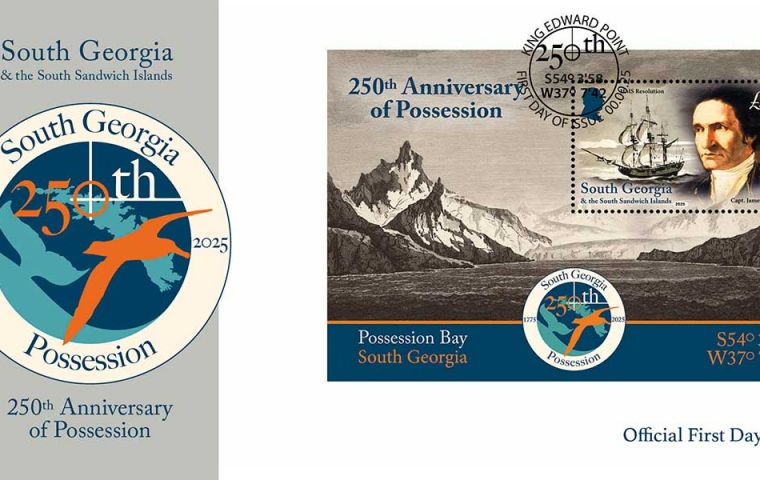MercoPress. South Atlantic News Agency
South Georgia Island, 250th Anniversary of British Possession, led by the great navigator James Cook
 The stamp issue commemorates Possession itself and the start of South Georgia’s 250-year journey from obscurity to the modern age.
The stamp issue commemorates Possession itself and the start of South Georgia’s 250-year journey from obscurity to the modern age. On the 17th of January 1775, English Captain James Cook landed at Possession Bay in South Georgia Island. While his vessel HMS Resolution sat at anchor in the bay, Cook went ashore, hoisted the British flag and performed the ceremony of taking possession of the island, in the name of King George III and his heirs.
The Falklands Post Service Limited to commemorate the occasion, has issued special stamps on the event and depicting the brilliant explorer and discoverer James Cook
In effect this 250th year we celebrate South Georgia and its change from a little known and little valued island to a thriving UK Overseas Territory which is globally renowned for championing science, conservation and sustainable management. Each set of stamps will focus on a different element of South Georgia and shine a light on both its history and its future.
This first issue commemorates Possession itself and the start of South Georgia’s 250-year journey from obscurity to the modern age.
Cook and his vessel HMS Resolution departed Plymouth Sound in July 1772 on an expedition to circumnavigate the globe as far south as possible and determine whether there was a great southern landmass. During the voyage the Resolution crossed the Antarctic circle twice and reached latitude of 71°10'S without sighting Antarctica. It was only on their homeward voyage when they sighted South Georgia.
After their initial discovery and landing, Cook began mapping the coastline, but did not bring his ship close into the island due to the dangerous conditions. Hopeful that he had finally discovered the great southern continent, reaching the southernmost point of the main island, those hopes were dashed and it was duly named Cape Disappointment. Other key landmarks around the coastline were named during this voyage including Cooper Island, Willis Island, Bird Island, Clerke Rocks, Bay of Isles and the Pickersgill Islands to name but a few.
Despite his significant contribution to the history of South Georgia, accounts from the time indicate that Cook was not enamoured by South Georgia. In his journal he described the island as “Lands doomed by Nature to perpetual frigidness, never to feel the warmth of the sun's rays, whose horrible and savage aspect I have no words to describe”. He lamented that there were no trees or shrubs and that pieces of ice were constantly breaking off and floating out to sea.
At the time, the main positive aspect that Cook took away from South Georgia was the huge abundance of fur seals, elephant seals and whales. When word of this discovery spread almost immediately it led to an influx of those intent on unconstrained harvesting. Unsustainable practices meant that in just a few decades’ fur seal populations were nearly wiped out and attention switched to harvesting whales and elephant seals for their oil.
This was a dark time in South Georgia’s history and is in sharp contrast to the contemporary attitudes which focus on stewardship and conservation of the environment rather than exploitation. Today, thanks to strict laws prohibiting harm to marine mammals and the ecosystem which supports them, the beaches and waters surrounding South Georgia are once again full of life. Visitors look at the island with wonder, not despair, and rather than being disappointed by our island state we are awed and uplifted by it.




Top Comments
Disclaimer & comment rules-

Read all commentsAs John McEnroe said to the umpire, 'You just can't be serious!'
Jan 17th, 2025 - 10:41 am 0Argentina’s Claim to South Georgia and the South Sandwich Islands: https://www.academia.edu/117735658/Argentinas_Claim_to_South_Georgia_and_South_Sandwich_Islands
Commenting for this story is now closed.
If you have a Facebook account, become a fan and comment on our Facebook Page!